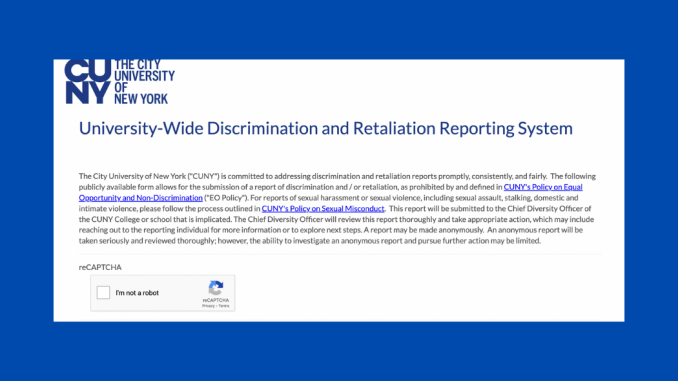
By Radwan Farraj
Reporting Assistance by Gabriela Flores
A new online portal for reporting acts of discrimination and retaliation was announced by CUNY on Jan. 30 to respond to rising levels of antisemitism nationwide. The portal is part of a university-wide initiative that started last fall to address acts of discrimination across campuses.
In partnership with Hillel International last September, the university expanded its Campus Climate Initiative to seven CUNY campuses, including Brooklyn College, which collaborates with administrators in higher education to develop inclusivity and positive campus climates for “Jewish students and all students,” according to Hillel International’s official website.
“Our University refuses to tolerate discrimination, antisemitism or hate of any kind, and we want every member of the CUNY community to feel welcomed and safe on our campuses,” said Chancellor Félix V. Matos Rodríguez in a Jan. 30 press release. “We must lead by example. This new reporting portal is one action among many we are taking as a community to combat antisemitism and all forms of hatred at CUNY.”
As part of the collaboration’s objectives to make CUNY communities safer, the online portal for reporting incidents of antisemitism and other forms of discrimination was made to streamline how staff and students contact college administrators. The portal would standardize the reporting process, promote transparency and accountability, and allow for the analysis of potential trends and patterns, wrote Nadya Drukker, executive director of Tanger Hillel, to The Vanguard.
Drukker noted that the intent of the portal’s creation and ultimate usage is for careful attention to situations, “potentially leading to better solutions for addressing and preventing such incidents in the future.”
Those filing a report through the portal have the option of doing so anonymously. When a report is filed at a particular college, the respective chief diversity officer can review the report and reach out to the individual who filed the report to take further action. “The portal will provide a secure platform for individuals to raise their concerns without fear of retaliation or negative consequences,” said Drukker. “By making it easier for individuals to share their experiences and collaborate with administrators, the portal can help foster a more inclusive and safe environment for everyone at Brooklyn College and across CUNY.”
Since September, CUNY has reported the distribution of $600,000 to 24 CUNY colleges to develop training, events, and programs that address antisemitism and other forms of discrimination. Another $150,000 was set aside to support campus climate work conducted by CUNY central offices, according to the latest press release.
In two separate town halls hosted last spring between Undergraduate Student Government leaders, Chief Diversity Officer Anthony Brown, and VP for Student Affairs Ronald Jackson, Jewish and Muslim students voiced concerns about the lack of an effective reporting system for students to turn to. At the time of the town hall, reports could only be sent through email and those who filed reports often did not know how reports were handled, according to Aharon Grama, president of USG.
“So I feel like this [online portal] was the direct answer from CUNY in order to solve that specific complaint about a reporting system regarding antisemitism and other hate speech,” said Grama.
In June of last year, the NYC Council Committee on Higher Education hosted two hearings to discuss antisemitism on CUNY campuses and to investigate the December 2021 passing of the CUNY Law Student Government Association’s Boycott, Divestment, and Sanctions resolution that protested CUNY’s support of Israel and companies that conduct business with Israel. The resolution was later supported by CUNY Law School faculty in May 2022 and the Committee on Higher Education invited Chancellor Rodríguez to both hearings to investigate how CUNY administration responded to the passing of this resolution. The chancellor did not show up to both hearings, according to The Times of Israel.
Comparing the process of filing a report via email versus through an official form, Grama opined that the official portal should make it easier to understand what information is required for an effective report to be submitted. “Forwarding people to an email and telling them to complain is, in my opinion, a lot less effective than having a form specifically for that. Because it’s less engaging, in my opinion,” stated Grama.
As of press time, the online portal has yet to reveal any patterns of discrimination across campuses with only a few weeks into its release. Carrie Ebbin, vice president of USG, told The Vanguard that she wished there are no future incidents of discrimination that would call for the online portal to be used in the first place.
“I’m kind of brainstorming different ways that we can help, you know, different ways to get creative,” said Ebbin. “But I’m curious to see how it ends up turning out, if we’ll hear anything from it.”
